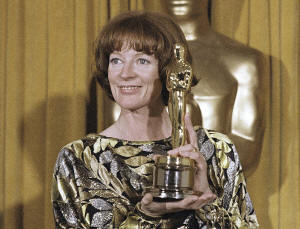Maggie Smith, scene-stealing actor famed for Harry Potter and 'Downton
Abbey,' dies at 89
 Send a link to a friend
Send a link to a friend
 [September 28, 2024]
By JILL LAWLESS [September 28, 2024]
By JILL LAWLESS
LONDON (AP) — Maggie Smith, the masterful, scene-stealing actor who won
an Oscar for the 1969 film “The Prime of Miss Jean Brodie” and gained
new fans in the 21st century as the dowager Countess of Grantham in “
Downton Abbey” and Professor Minerva McGonagall in the Harry Potter
films, died Friday. She was 89.
Smith's sons, Chris Larkin and Toby Stephens, said in a statement that
Smith died early Friday in a London hospital.
“She leaves two sons and five loving grandchildren who are devastated by
the loss of their extraordinary mother and grandmother,” they said in a
statement issued through publicist Clair Dobbs.
Smith was frequently rated the preeminent British female performer of a
generation that included Vanessa Redgrave and Judi Dench, with two
Oscars, a clutch of Academy Award nominations and a shelf full of acting
trophies.
She made her film debut in the 1950s, won Oscars for work in the 60s and
70s and had memorable roles in each subsequent decade, including an
older Wendy in Peter Pan story “Hook” (1991) and a mother superior of a
convent in Whoopi Goldberg's comedy “Sister Act” (1992).
A commanding stage actor, she played Shakespearean tragedy — 1965
adaptation “Othello” — and voiced Shakespeare-inspired animation in
“Gnomeo & Juliet” (2011).
She remained in demand even in her later years, despite her lament that
“when you get into the granny era, you’re lucky to get anything.”
Smith drily summarized her later roles as “a gallery of grotesques,”
including Professor McGonagall. Asked why she took the role, she
quipped: “Harry Potter is my pension.”

Richard Eyre, who directed Smith in a television production of
“Suddenly, Last Summer,” said she was “intellectually the smartest
actress I’ve ever worked with. You have to get up very, very early in
the morning to outwit Maggie Smith.”
"Jean Brodie," in which she played a dangerously charismatic Edinburgh
schoolteacher, brought her the Academy Award for best actress, and the
British Academy Film Award (BAFTA) as well.
Smith added a supporting actress Oscar for “California Suite” in 1978,
Golden Globes for “California Suite” and “A Room with a View,” and
BAFTAs for lead actress in “A Private Function” in 1984, “A Room with a
View” in 1986 and “The Lonely Passion of Judith Hearne” in 1988.
She also received Academy Award nominations as a supporting actress in
“Othello,” “Travels with My Aunt,” “A Room with a View” and “Gosford
Park,” and a BAFTA award for supporting actress in “Tea with Mussolini.”
On stage, she won a Tony in 1990 for “Lettice and Lovage.”
From 2010, she was the acid-tongued Violet Crawley, Dowager Countess of
Grantham, in hit TV period drama “ Downton Abbey,” a role that won her
legions of fans, three Emmy Awards, a Golden Globe and a host of other
awards nominations.
But she chafed at television fame. When the show's run ended in 2016,
Smith said she was relieved. “It’s freedom," she told The Associated
Press.
“Not until ‘Downton Abbey’ was I well-known or stopped in the street and
asked for one of those terrible photographs," she said.
She continued acting well into her 80s, in films including the
big-screen spinoff to “Downton Abbey” in 2019, its 2022 sequel “Downton
Abbey: A New Era” and 2023 release "The Miracle Club."
Smith had a reputation for being difficult, and sometimes upstaging
others.
Richard Burton remarked that Smith didn’t just take over a scene in “The
VIPs” with him: “She commits grand larceny.” However, the director Peter
Hall found that Smith wasn’t “remotely difficult unless she’s among
idiots. She’s very hard on herself, and I don’t think she sees any
reason why she shouldn’t be hard on other people, too.”
Smith conceded that she could be impatient at times.
“It’s true I don’t tolerate fools, but then they don’t tolerate me, so I
am spiky,” Smith said. “Maybe that’s why I’m quite good at playing spiky
elderly ladies.”
Critic Frank Rich, in a New York Times review of “Lettice and Lovage,”
praised Smith as “the stylized classicist who can italicize a line as
prosaic as ‘Have you no marmalade?’ until it sounds like a freshly
minted epigram by Coward or Wilde.”
Smith famously drew laughs from a prosaic line — “This haddock is
disgusting” — in a 1964 revival of Noel Coward’s “Hay Fever.”

[to top of second column]
|

Actress Maggie Smith holds her Oscar for best supporting actress in
the film "California Suite" in Los Angeles, April 9, 1979. Smith,
who won an Oscar for “The Prime of Miss Jean Brodie” in 1969 and won
new fans in the 21st century as the dowager Countess of Grantham in
“Downton Abbey,” has died at 89. (AP Photo/Reed Saxon, File)
 She repeated the gift for one-liners
in “Downton Abbey,” when the tradition-bound Violet witheringly
asked, “What is a weekend?”
King Charles III and his wife Queen Camilla paid tribute to Smith,
who was made a Dame Commander of the British Empire, the equivalent
of a knight, by the late Queen Elizabeth II in 1990.
“As the curtain comes down on a national treasure, we join all those
around the world in remembering with the fondest admiration and
affection her many great performances, and her warmth and wit that
shone through both off and on the stage," they said in a statement.
Fellow actors paid tribute to her on Friday. Hugh Bonneville, who
played the son of Smith's character in “Downton Abbey,” said “anyone
who ever shared a scene with Maggie will attest to her sharp eye,
sharp wit and formidable talent.”
“She was a true legend of her generation and thankfully will live on
in so many magnificent screen performances," he said in a statement.
Rob Lowe, who co-starred with her in “Suddenly, Last Summer,” said
the experience was "unforgettable ... sharing a two-shot was like
being paired with a lion.”
“She could eat anyone alive, and often did. But funny, and great
company. And suffered no fools. We will never see another. God
speed, Ms. Smith!” Lowe wrote on X.
Prime Minister Keir Starmer called Smith “a true national treasure
whose work will be cherished for generations to come.”
Margaret Natalie Smith was born in Ilford, on the eastern edge of
London, on Dec. 28, 1934. She summed up her life briefly: “One went
to school, one wanted to act, one started to act, one’s still
acting.”
Her father was assigned in 1939 to wartime duty in Oxford, where her
theater studies at the Oxford Playhouse School led to a busy
apprenticeship.
“I did so many things, you know, round the universities there. ...
If you were kind of clever enough and I suppose quick enough, you
could almost do weekly rep because all the colleges were doing
different productions at different times,” she said in a BBC
interview.
She took Maggie as her stage name because another Margaret Smith was
active in the theater.
Laurence Olivier spotted her talent, invited her to be part of his
original National Theatre company and cast her as his co-star in a
1965 film adaptation of “Othello.”

Smith said two directors, Ingmar Bergman and William Gaskill, both
in National Theatre productions, were important influences.
Alan Bennett, preparing to film the monologue “A Bed Among the
Lentils,” said he was wary of Smith’s reputation for becoming bored.
As the actor Jeremy Brett put it, “she starts divinely and then goes
off, rather like a cheese.”
“So the fact that we only just had enough time to do it was an
absolute blessing really because she was so fresh and just so into
it,” said Bennett. He also wrote a starring role for Smith in “The
Lady in the Van,” as Miss Shepherd, a redoubtable woman who lived
for years in her vehicle on Bennett’s London driveway.
However extravagant she may have been on stage or before the
cameras, Smith was known to be intensely private.
“She never wanted to talk about acting. Acting was something she was
terrified to talk about because if she did, it would disappear,"
said Simon Callow, who performed with her in “A Room with a View.”
Smith married fellow actor Robert Stephens in 1967. They had two
sons, Christopher and Toby — who both grew up to be actors — and
divorced in 1975. The same year she married the writer Beverley
Cross, who died in 1998.
___
Hilary Fox and Pan Pylas in London contributed to this story.
Associated Press writer Robert Barr contributed biographical
material to this obituary before his death in 2018.
All contents © copyright 2024 Associated Press. All rights reserved |